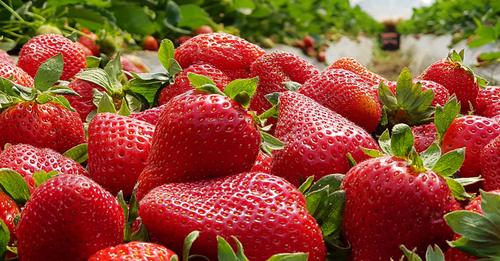Oct 13, 2021Applications for premium strawberry flavors’ research sought by PIP
Food production faces challenges from climate change, competition for scarce resources and supply chain disruptions. One solution is controlled environment agriculture, which grows a range of crops in controlled spaces and can enhance desirable traits in crops.
To advance controlled environment agriculture science, the Foundation for Food & Agriculture Research’s (FFAR) Precision Indoor Plants (PIP) consortium seeks research applications focused on understanding the genetic and biochemical elements responsible for premium strawberry flavors, in addition to the environmental control of these elements.
“Strawberries have a range of flavors that have been lost in modern varieties, but these flavor profiles still exist in nature,” said FFAR Scientific Program Director John Reich, director of PIP. “By understanding genetic and environmental influences on flavor, we can not only recover these flavors, but also expand our abilities to adapt crops to controlled environment agriculture.
This funding opportunity aims to build on existing strawberry research, including flavor research, to increase scientific understanding of premium flavors in strawberry and how flavorful strawberries can impact the controlled environment agriculture sector. Premium flavors, in this context, are novel flavors with potential commercial value that are largely absent in modern commercial varieties, not the enhancement of existing flavor varieties.
Eligible projects must identify genetic elements responsible for premium flavors, the chemical constituents responsible for those flavors, and environmental inputs that lead to the growing premium-flavored strawberries in controlled environment production systems.
Applicants from institutions of higher education, non-profit and for-profit organizations, government-affiliated researchers and domestic and international organizations are eligible for this opportunity. FFAR further highly encourages applications from Hispanic-serving institutions, 1890s Land Grant Institutions and other Historically Black Colleges and Universities, Tribal Colleges and Universities, Alaska Native and Native Hawaiian Serving Institutions and Asian American and Native American Pacific Islander Serving Institutions.
According to Reich “Controlled environment agriculture could solve a myriad of food and agriculture challenges. This type of agriculture system can be housed in non-traditional spaces, including abandoned buildings, old warehouse and garages. As these spaces are often in or near urban areas, the foods grown there are closer to their intended consumers, reducing transportation costs and potential bringing new economic opportunities into communities.”
From a scientific standpoint, controlled environments offer unprecedented opportunities to improve nutritional content, flavor and crop quality. PIP leverages private-sector investments to develop crops specifically for controlled environment agriculture.<
As the consortium is fully funded by FFAR and its participants, there is no matching funds requirement for this funding opportunity. However, if a for-profit institution is part of the proposal, the project must have contributions from that organization.
PIP is accepting pre-applications until Nov. 10, 2021 at 5 p.m. EST. Approved pre-applications will receive an invitation on Jan. 4, 2022, to submit a full application. Specific information about nominations, eligibility and the application process can be found on FFAR’s website.
Precision Indoor Plants (PIP) is a public-private partnership created by the Foundation for Food & Agriculture Research (FFAR) to produce new flavorful, nutritious crops specially intended for indoor agriculture. By focusing on innovative science and technology, the consortium’s research efforts will increase our ability to produce crops that are high value, of consistent quality and desired by consumers. Ultimately, PIP can help food producers grow flavorful, nutritious food indoors.
FFAR’s initial $7.5 million investment is matched by the PIP participants for a total investment of $15 million to develop flavorful, nutritious crops for indoor agriculture. PIP’s participants include AeroFarms, BASF, Benso















